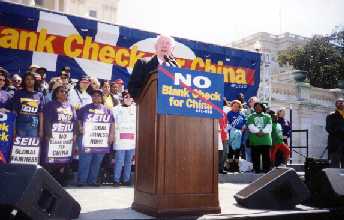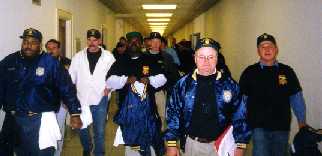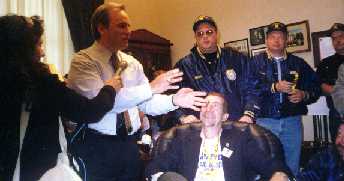|
Return to On the Road with John Tarleton
Labor Takes China Free Trade Battle into the Halls of Congress
by John Tarleton WASHINGTON, DC—Don Baux of Washington, Pennsylvania drives a truck for a living. He has been a Teamster for 28 years. On Wednesday, he took the day off and caught a southbound bus at 4 a.m. Congress is currently considering whether to approve Permanent Normal Trade Relations (PNTR) with China. And, for the first time in his life Baux was going to Capitol Hill to do some lobbying. "It¹s all about money," Baux said of PNTR, which is supported by Big Business, the White House and Republican leaders in Congress.
An All-Out BlitzBaux was a part of a contingent of 500 Teamsters from western Pennsylvania who joined in Wednesday¹s broad-based labor rally on the steps of Capitol Hill. Besides the Teamsters, thousands of autoworkers, steelworkers, teachers, municipal employees, service workers, etc. were on hand. With the China vote tentatively scheduled for late May, the unions were launching an all-out lobbying blitz.
China¹s one-party state has a notorious human rights record. Independent labor unions are forbidden. Any political dissent is swiftly crushed. Even apolitical groups like Fulan Gong have been severely repressed. Workers earn as little as 13 cents per hour while working long shifts in often dangerous conditions. It is the ultimate low-wage haven. "We are here to say that the rules of global trade have been rigged for too long," said Jay Mazur, president of UNITE. "We are not going to play by their rules anymore! We will never, ever accept a definition of trade that promotes exploitation in the name of freedom."
An Evolving Labor MovementThe US labor movement, led by the AFL-CIO, has evolved in the past five years. Assailed by the forces of corporate globalization, it has reinvigorated itself with stepped-up recruiting (especially in the service industries) and increased involvement in electoral politics. Still, it can be maddeningly parochial at times. On Wednesday, one speaker after another attacked China for acting like a "rogue nation", for possessing weapons of mass destruction and for using prison labor, as if the same couldn¹t be said of the United States. But, where it once stood aloof from the social justice struggles of the 1960s, the labor movement now reaches out to women, minorities and environmentalists. The victory in Seattle wouldn¹t have been possible without Labor's numbers and resources. Many people in the crowd, like Baux, had traveled overnight from places like Harrisburg, Pennsylvania, Mansfeld, Ohio and Flint, Michigan that don't even appear on the map of the "new economy". They were mostly middle-aged and older. They had creaky knees and faces etched with lines of concern. Globalization isn't showering its benefits on them. When Rep. David Bonior (D-Michigan) said that "we are for an America that doesn't give the back of its hand to those who work with their hands" his audience understood. Before the rally ended and the different groups broke up to visit their Congresspersons, Gerald McEntee, president of the American Federation of State County and Municipal Employees Union, urged those gathered to lobby hard. "Remember in November!" He said. "There are more workers than CEOs."
Teamsters on the MarchStriding through ornate Congressional hallways, Baux and the other Pennsylvania Teamsters were a strange but refreshing site. The corporate lobbyists and the other Inside the Beltway lifers got the hell out of their way. The plan was to pay a visit to several Congressmen before they caught the bus home.
The first target was Rep. Mike Doyle (D.) of Pennsylvania¹s 18th Congressional District. Doyle's receptionist was a bit flustered when his visitors showed up unannounced. "I'd offer you seats but I don't have a hundred of them", she said, her voice trailing off. "How about coffee!" Someone blurted out. "It¹s cold," she murmured before disappearing into the back of the office. There was a couple moments of confusion as the blue-jacketed Teamsters milled around just inside the front doorway. Then, a friendly face peaked into the front foyer. "Well come on in! Don't stand out in the hallway." It was Mike Doyle.
"Let me make this real easy for you. We will be voting against Permanent... (burst of applause from Teamsters)...If anybody thinks I'm in the undecided column, let them take me out of that right now." A Congressman's life is lived in 15-minute segments. After some more small talk about a Congressional race in a neighboring district, the Teamsters got up to leave. There was a final round of handshakes and photos with the congressman. And then, the Teamsters were back out in the hallway.
StiffedRep. John Peterson (R.) of Pennsylvania¹s Fifth district was next on the list. "That should be interesting," someone said. Peterson is a staunch conservative and the difference in how the Teamsters were received was night and day. The congressman was busy in a meeting , a junior staffer explained. And he had another one to go to right after that. He was going to be busy all afternoon. The aide was polite but didn't try to hide his indifference. Thomas Griffith, President of the Pennsylvania Teamsters, asked what Peterson's stance on the China bill was. The young staffer hedged. 40 or so Teamsters were glowering at him. "He really hasn't made his position public." Griffith scowled. He handed the staffer some literature and said, "this China bill is bad for America and it's going to be bad for the Congressman in November if he votes for it." Griffith then turned and walked out of the office. "I just tell it like it is," he said.
Ron KlinkThe Teamsters soon found themselves on friendly ground again. Rep. Ron Klink (D.) of Pennsylvania¹s Fourth District voted against NAFTA, GATT and Fast Track. The former television anchorman recently won a 4-way primary campaign to be the Democratic nominee in Pennsylvania's Senate race this fall. The Teamsters were ushered into his office while someone went to fetch the Congressman. One of Klink's aides quickly handicapped the China vote. The vote is a toss-up, he said, but the Republican leadership was "breaking arms" (not just twisting them) to get renegade members back in line. The unions' lobbying efforts were crucial. "It¹s a problem when the Democratic President supports this," Griffith noted. The aide rolled his eyes. "This is a problem we've had for 6 1/2, 7 years." Klink entered the room and offered a hearty handshake to each Teamster. In an era of low voter turnout, it was dedicated union folks like this who could put him in the US Senate. Klink offered the chair behind his desk to one of the Teamsters who was standing next to it. The man sheepishly refused and Klink offered it again. "Tell him it's break!" someone called out and the room roared with laughter. Klink then reiterated his opposition to PNTR with China. Now isn't the right time. China's human rights record is terrible. They can't be counted on to trade fairly. Whereas Doyle was charming and gregarious, the silver-haired Klink was more grave and reserved, more Senatorial. He recalled how Clinton rammed NAFTA through seven years ago and encouraged his guests to keep on working hard. "I've never been sicker in my life," he said, "than the day I realized we were going to lose on that vote because I knew what it was going to mean to every family in America." Klink quickly moved onto analyzing his opponent in the upcoming Senate race and how he might try to split the union vote. Time was soon up and we were back out in the hallway. It was time for the Teamsters to catch the bus home. Don Baux would be back in Washington, Pa. by 9 o'clock. It had been a long and satisfying first day as a Congressional lobbyist. "It's a good way to spend a Wednesday in April," he said. "Any time you can make your opinions known to your representatives, it's worth it. That's what democracy is about. Correct?"
|
 "This is a part of a long-term campaign to make the global economy work for
working families," said John Sweeney, president of the 12 million member
AFL-CIO, the nation¹s largest federation of trade unions.
"This is a part of a long-term campaign to make the global economy work for
working families," said John Sweeney, president of the 12 million member
AFL-CIO, the nation¹s largest federation of trade unions.
 "We are holding them accountable," said Roy Marshall, president of Local 585
in Washington, Pa. "We want them to remember us when the President calls and
that we will vote in November."
"We are holding them accountable," said Roy Marshall, president of Local 585
in Washington, Pa. "We want them to remember us when the President calls and
that we will vote in November."
 A busload of Teamsters poured into his office. There was friendly bantering
and small talk as Doyle let them settle in. The sense of having access to
power is seductive. Then, the third-term congressman came to his point.
A busload of Teamsters poured into his office. There was friendly bantering
and small talk as Doyle let them settle in. The sense of having access to
power is seductive. Then, the third-term congressman came to his point.